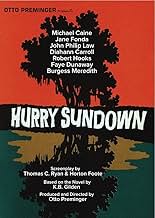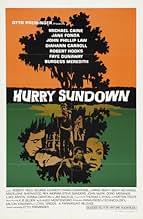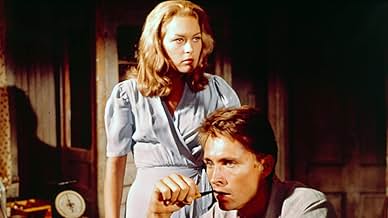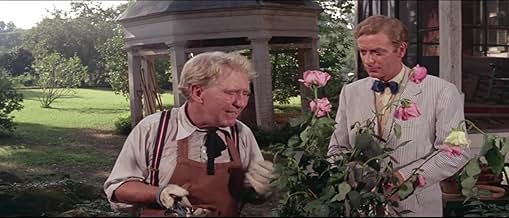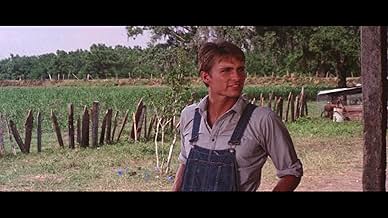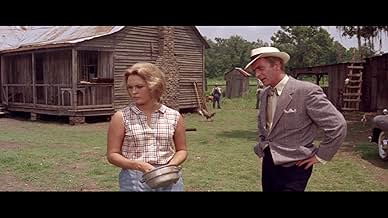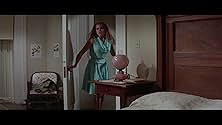NOTE IMDb
5,9/10
1,5 k
MA NOTE
Ajouter une intrigue dans votre langueDrama of a ruthless Southern opportunist who tries to buy his cousin's land, and when thwarted, brings several tragedies to the lives of his loved ones.Drama of a ruthless Southern opportunist who tries to buy his cousin's land, and when thwarted, brings several tragedies to the lives of his loved ones.Drama of a ruthless Southern opportunist who tries to buy his cousin's land, and when thwarted, brings several tragedies to the lives of his loved ones.
- Réalisation
- Scénario
- Casting principal
- Victoire aux 1 BAFTA Award
- 1 victoire et 2 nominations au total
Avis à la une
I'm really not understanding why folks are so down on this film. Hurry Sundown
is far from the masterpiece of Otto Preminger's career. But he did assemble a
good cast who as an ensemble do quite well in their roles.
Michael Caine and John Philip Law are cousins. Caine used to work on a shrimp boat but married into southern gentry when he wed Jane Fonda. He's now trying to be a big shot businessman putting together parcels of land. Only two won't sell out Law and black neighbor Robert Hooks.
Law has just returned from World War 2 to wife Faye Dunaway and their kids. The war has taken him away from the south and given him an itch to wonder. He might sell, but Caine relies too much on the blood connection and approaches him all wrong.
Law does the unheard of thing in the post World War 2 south, he partners with Hooks and they dig some needed irrigation ditches using explosives.
That sets off all that follows because law and with some trepidation goes into a partnership with a black man. Something that just wasn't done in Georgia of 1946.
Both Fonda and Dunaway are ravishing and both are coming into their own as name players. Caine follows in the tradition of British actors playing southerners that seems to have started with Leslie Howard and Gone With The Wind. Law is the key character in this drama, it's his decisions are what turn the plot and he runs a good range of emotions doing it.
Hurry Sundown is not a bad picture of the south just before the civil rights revolution. Believe me pay no attentions to the bad reviews.
Michael Caine and John Philip Law are cousins. Caine used to work on a shrimp boat but married into southern gentry when he wed Jane Fonda. He's now trying to be a big shot businessman putting together parcels of land. Only two won't sell out Law and black neighbor Robert Hooks.
Law has just returned from World War 2 to wife Faye Dunaway and their kids. The war has taken him away from the south and given him an itch to wonder. He might sell, but Caine relies too much on the blood connection and approaches him all wrong.
Law does the unheard of thing in the post World War 2 south, he partners with Hooks and they dig some needed irrigation ditches using explosives.
That sets off all that follows because law and with some trepidation goes into a partnership with a black man. Something that just wasn't done in Georgia of 1946.
Both Fonda and Dunaway are ravishing and both are coming into their own as name players. Caine follows in the tradition of British actors playing southerners that seems to have started with Leslie Howard and Gone With The Wind. Law is the key character in this drama, it's his decisions are what turn the plot and he runs a good range of emotions doing it.
Hurry Sundown is not a bad picture of the south just before the civil rights revolution. Believe me pay no attentions to the bad reviews.
This is the most embarrassing excuse for a serious picture I have ever seen.
I'm sure "Hurry Sundown" tested the pre-ratings MPAA for it's supposedly frank depiction of sexual themes. It probably required television editing as ABC ran this film several times in the early '70s.
You could cut the sexual tension with a knife if it wasn't so funny. Jane Fonda seductively playing the sax with Michael Caine was probably suggestive enough to cause the censors to get nervous. But then we have Faye Dunaway's cartoonish overacting in that bedroom scene with John Phillip Law. At least poor white trash have healthy sex lives.
The only thing criminal about this movie is that it attempted to tackle the thorny subject of race relations in the 1940s in such a cheap, heavy handed manner.
I'm sure "Hurry Sundown" tested the pre-ratings MPAA for it's supposedly frank depiction of sexual themes. It probably required television editing as ABC ran this film several times in the early '70s.
You could cut the sexual tension with a knife if it wasn't so funny. Jane Fonda seductively playing the sax with Michael Caine was probably suggestive enough to cause the censors to get nervous. But then we have Faye Dunaway's cartoonish overacting in that bedroom scene with John Phillip Law. At least poor white trash have healthy sex lives.
The only thing criminal about this movie is that it attempted to tackle the thorny subject of race relations in the 1940s in such a cheap, heavy handed manner.
It's difficult to concisely describe the plot of Hurry Sundown; it's a film about the racial divide, family squabbles, class distinction, and corporate takeover of land. Among the subplots are marital difficulties, Southern life, parenthood, a developmentally challenged child, questionable honor of the legal system, and coming-of-age dilemmas.
Michael Caine is married to Jane Fonda, and while they're a well-to-do Southern couple on the outside, beneath the surface lies infidelity and parenting issues. Michael's poor cousin, John Phillip Law, is married to Faye Dunaway, and he also has trouble with his children. Robert Hooks and his mother Beah Richards live on land that used to belong to Jane's family, back when they owned slaves. As a gift, they gave the land to Beah, but when Michael Caine's company wants to build on it, racial tensions lead to unforeseen consequences that affect all three families.
Even though I have a soft spot in my heart for Michael Caine and refuse to ever really see him as a bad guy, he's known for his meaner roles. In Hurry Sundown, he's just about as mean as it gets. He gives a fantastically chilling performance, and his Southern accent is nearly flawless. Faye Dunaway also stands out in her smaller role, since it's unlike the cold, calculating, classy roles she usually takes. Be on the lookout for Diahann Carroll, Burgess Meredith, and George Kennedy as the adorable but incompetent sheriff.
This is a very well-acted film that fits in with other hot-blooded films of its time, like In the Heat of the Night and The Long, Hot Summer. It's one of the steamiest films made in the 1960s, and it sheds light on a number of important issues. Director Otto Preminger, king of films that push the envelope, creates another masterpiece that makes you feel like you need a good scrubbing after watching it.
Kiddy Warning: Obviously, you have control over your own children. However, due to racial language, sexual situations, and violence involving children, I wouldn't let my kids watch it.
Michael Caine is married to Jane Fonda, and while they're a well-to-do Southern couple on the outside, beneath the surface lies infidelity and parenting issues. Michael's poor cousin, John Phillip Law, is married to Faye Dunaway, and he also has trouble with his children. Robert Hooks and his mother Beah Richards live on land that used to belong to Jane's family, back when they owned slaves. As a gift, they gave the land to Beah, but when Michael Caine's company wants to build on it, racial tensions lead to unforeseen consequences that affect all three families.
Even though I have a soft spot in my heart for Michael Caine and refuse to ever really see him as a bad guy, he's known for his meaner roles. In Hurry Sundown, he's just about as mean as it gets. He gives a fantastically chilling performance, and his Southern accent is nearly flawless. Faye Dunaway also stands out in her smaller role, since it's unlike the cold, calculating, classy roles she usually takes. Be on the lookout for Diahann Carroll, Burgess Meredith, and George Kennedy as the adorable but incompetent sheriff.
This is a very well-acted film that fits in with other hot-blooded films of its time, like In the Heat of the Night and The Long, Hot Summer. It's one of the steamiest films made in the 1960s, and it sheds light on a number of important issues. Director Otto Preminger, king of films that push the envelope, creates another masterpiece that makes you feel like you need a good scrubbing after watching it.
Kiddy Warning: Obviously, you have control over your own children. However, due to racial language, sexual situations, and violence involving children, I wouldn't let my kids watch it.
If Otto Preminger's "Hurry Sundown" is guilty of anything, it's biting off more than it can chew. With a 146 minute running time, a clutter of stars and characters, and what seems like a jumble of conflicting themes, "Hurry Sundown" has been seen by many critics as opportunistic rabble-rousing, overtly melodramatic and clunky. But if you look past Preminger's drive to get attention and Michael Caine's questionable southern accent, you may find a wholly entertaining film or failing that, a period piece that encapsulates the feelings of its maker/s at a time when such issues as racism ran rampant.
When a cannery looks to buy large plots of uncultivated farmland, local big cheese Henry Warren (Michael Caine) enthusiastically becomes partners to the plan selling his wife Julie's (Jane Fonda) family's land at a profit. However, to make the deal he must convince his cousin Rad (John Phillip Law) and his wife's old mammy Rose (Beah Richards) to sell their plots as well. When Rose dies of a heart attack, her son Reeve (Robert Hooks) becomes landowner but is then sued for ownership by Henry. Reeve and Rad must then work together to fight battles both real and legal to keep their homes from being destroyed.
The lack of tact in this film is stupefyingly brilliant. With the bluntness of TNT, "Hurry Sundown" creates not characters but caricatures. George Kennedy makes an appearance as a bumbling Sheriff, Burgess Meredith as a bigoted judge and Madeleine Sherwood as the saintly teacher who eggs Reeves on. All you need is a snooty butler and a buxom blonde bimbo and you got yourself a stock character Christmas. Still it's in their simplicity that you find the true virtue of the film. Their is no nuance in racism, nor is their any when you're exploiting friends and family like Henry does. The good guys are good, the bad guys are bad, their is no in-between and for better or worse, Preminger seems to feel very strongly about that fact.
Racism is the primary theme and focus of "Hurry Sundown" but it is by no means the only theme, nor the only controversy during release. sexuality and fidelity have their time in the sun as well. Rad and his wife Lou (Faye Dunaway) enjoy a healthy sex life while Henry and Julie sexually frustrate each other to the point of violence. Preminger really does seem to take delight in toying with the emotions of his characters (as well as taking suggestive camera shots), as shown when Fonda attempts to seduce Henry with his own saxophone. In addition, family relationships, greed, corruption, religion are also expanded on, creating a solid if hyperbolic worldview. Like a splatter painting its messy yet colorful.
All in all, "Hurry Sundown" has the pulpy sensationalism you can expect from an Otto Preminger production. His passion for the material shines through even when the story strays into melodrama. While filming in Louisiana, locals attempted to sabotage filming to the point of sniping a convoy of cast and crew members. It reminds me of an adage I once heard; "If they're shooting at you, you're doing something right."
http://theyservepopcorninhell.blogspot.com/
When a cannery looks to buy large plots of uncultivated farmland, local big cheese Henry Warren (Michael Caine) enthusiastically becomes partners to the plan selling his wife Julie's (Jane Fonda) family's land at a profit. However, to make the deal he must convince his cousin Rad (John Phillip Law) and his wife's old mammy Rose (Beah Richards) to sell their plots as well. When Rose dies of a heart attack, her son Reeve (Robert Hooks) becomes landowner but is then sued for ownership by Henry. Reeve and Rad must then work together to fight battles both real and legal to keep their homes from being destroyed.
The lack of tact in this film is stupefyingly brilliant. With the bluntness of TNT, "Hurry Sundown" creates not characters but caricatures. George Kennedy makes an appearance as a bumbling Sheriff, Burgess Meredith as a bigoted judge and Madeleine Sherwood as the saintly teacher who eggs Reeves on. All you need is a snooty butler and a buxom blonde bimbo and you got yourself a stock character Christmas. Still it's in their simplicity that you find the true virtue of the film. Their is no nuance in racism, nor is their any when you're exploiting friends and family like Henry does. The good guys are good, the bad guys are bad, their is no in-between and for better or worse, Preminger seems to feel very strongly about that fact.
Racism is the primary theme and focus of "Hurry Sundown" but it is by no means the only theme, nor the only controversy during release. sexuality and fidelity have their time in the sun as well. Rad and his wife Lou (Faye Dunaway) enjoy a healthy sex life while Henry and Julie sexually frustrate each other to the point of violence. Preminger really does seem to take delight in toying with the emotions of his characters (as well as taking suggestive camera shots), as shown when Fonda attempts to seduce Henry with his own saxophone. In addition, family relationships, greed, corruption, religion are also expanded on, creating a solid if hyperbolic worldview. Like a splatter painting its messy yet colorful.
All in all, "Hurry Sundown" has the pulpy sensationalism you can expect from an Otto Preminger production. His passion for the material shines through even when the story strays into melodrama. While filming in Louisiana, locals attempted to sabotage filming to the point of sniping a convoy of cast and crew members. It reminds me of an adage I once heard; "If they're shooting at you, you're doing something right."
http://theyservepopcorninhell.blogspot.com/
5tavm
I first knew about this film when I read about it in the book, "The Fifty Worst Films of All Time" and I also found out about its location shooting in my current hometown of Baton Rouge, La., either there or elsewhere. I also read that the locals there treated the cast and crew hostilely which makes me glad that my family didn't even move there until 1975 when I was about 7 and being just a kid, I usually got away with getting occasionally angry whenever other children my age called me "Chinese" (I'm actually of Filipino descent). About the movie itself, well, the first 30 minutes seemed all right dramatically-wise with the setting up of characters before Beah Richards' over-the-top heart attack turned the picture into close of an overheated soap opera worthy of "Dallas"-of which George Kennedy, who's a hoot as the sheriff with a penchant for liking the "coloreds", would join the cast of in the late '80s-especially whenever that mentally-challenged kid of Michael Caine and Jane Fonda was constantly crying. Caine had just become a star with Alfie while Ms. Fonda would become a sex symbol with Barbarella though maybe this film also contributed to her status when she played hubby Caine's sax. Another notable appearance was that of Faye Dunaway in an early role just before she became a star in Bonnie and Clyde. Burgess Meredith chews plenty of scenery as a bigoted judge especially when sharing some of that with Jim Backus as one of the attorneys in a court scene. By the way, Backus wasn't the only Sherwood Schwartz series regular-from "Gilligan's Island"-in that sequence as future star of "The Brady Bunch"-Robert Reed-would be his opposite here. And then there's Diahann Carroll who would later star in her own groundbreaking series the following year called "Julia". Okay, with that out of the way, I'll just say that I thought the drama was entertaining but I also knew that it's not for all tastes and leave it at that. So on that note, I recommend Hurry Sundown. P.S. On Wikipedia, I just found out that Preminger picked BR on the recommendation of production designer Gene Callahan who lived and eventually died there.
Le saviez-vous
- AnecdotesMichael Caine's first attempt at an "American" accent. Vivien Leigh told him to memorize the phrase "four-door Ford".
- GaffesIn one scene, as the camera pans down the street, a later model Ford is in a carport.
- Citations
Julie Ann Warren: It wasn't until I was ten years old that I realized that "damn" and "Yankee" were two separate words!
- Crédits fousThe Paramount logo does not appear on this film.
- ConnexionsEdited into Austin Powers dans Goldmember (2002)
Meilleurs choix
Connectez-vous pour évaluer et suivre la liste de favoris afin de recevoir des recommandations personnalisées
- How long is Hurry Sundown?Alimenté par Alexa
Détails
- Date de sortie
- Pays d’origine
- Langue
- Aussi connu sous le nom de
- Hurry Sundown
- Lieux de tournage
- 7307 Goodwood Avenue, Baton Rouge, Louisiane, États-Unis(Henry & Julie Warren's mansion)
- Société de production
- Voir plus de crédits d'entreprise sur IMDbPro
Box-office
- Budget
- 4 000 000 $US (estimé)
Contribuer à cette page
Suggérer une modification ou ajouter du contenu manquant

